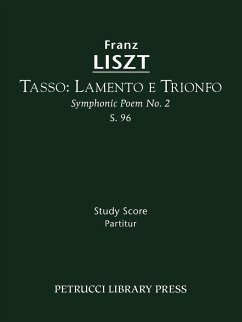
Dante Symphony, S.109
Study score
Herausgeber: Taubmann, Otto
Versandkostenfrei!
Versandfertig in 1-2 Wochen
19,99 €
inkl. MwSt.

PAYBACK Punkte
10 °P sammeln!
Composed in 1855-56, Liszt's "Symphony to Dante's 'Divina Commedia'" is programmatic work depicting Dante's journey through hell and purgatory. It was quite advanced for its era, employing many new orchestral colors and daring harmonic schemes. The work's disastrous premiere, given under the composer's direction on November 7th, 1857 in Dresden's Hoftheater, was a public humiliation for the composer. Despite the rocky start, the work's quality and value became apparent over time. The present score is a digitally-restored reissue of the one first published in 1920 by Breitkopf und Härtel as vo...
Composed in 1855-56, Liszt's "Symphony to Dante's 'Divina Commedia'" is programmatic work depicting Dante's journey through hell and purgatory. It was quite advanced for its era, employing many new orchestral colors and daring harmonic schemes. The work's disastrous premiere, given under the composer's direction on November 7th, 1857 in Dresden's Hoftheater, was a public humiliation for the composer. Despite the rocky start, the work's quality and value became apparent over time. The present score is a digitally-restored reissue of the one first published in 1920 by Breitkopf und Härtel as volume 7 of "Franz Liszts Musikalische Werke", edited by Otto Taubmann with a preface by Peter Raabe. In contrast so many of the on-demand scores now available this one comes with all the pages with each image thoroughly checked to make sure it is readable, then beautifully printed on quality stock with an attractive glossy cover. The matching large conductor's score and orchestral parts are now also available from Serenissima Music.














